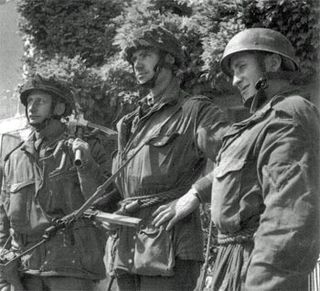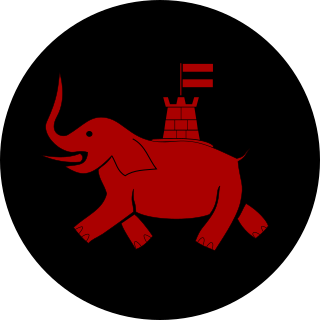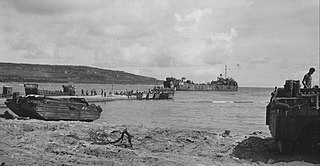Related Research Articles

The Irgun was a Zionist paramilitary organization that operated in Mandate Palestine between 1931 and 1948. The organization is also referred to as Etzel, an acronym of the Hebrew initials, or by the abbreviation IZL. It was an offshoot of the older and larger Jewish paramilitary organization Haganah. When the group broke from the Haganah it became known as the Haganah Bet, or alternatively as haHaganah haLeumit or Hama'amad. Irgun members were absorbed into the Israel Defense Forces at the start of the 1948 Arab–Israeli war.

Field Marshal Henry Maitland Wilson, 1st Baron Wilson,, also known as Jumbo Wilson, was a senior British Army officer of the 20th century. He saw active service in the Second Boer War and then during the First World War on the Somme and at Passchendaele. During the Second World War he served as General Officer Commanding-in-Chief (GOC-in-C) British Troops in Egypt, in which role he launched Operation Compass, attacking Italian forces with considerable success, in December 1940. He went on to be Military Governor of Cyrenaica in February 1941, commanding a Commonwealth expeditionary force to Greece in April 1941 and General Officer Commanding (GOC) British Forces in Palestine and Trans-Jordan in May 1941.

Allied Force Headquarters (AFHQ) was the headquarters that controlled all Allied operational forces in the Mediterranean Theatre of World War II from August 1942 until the end of the war in Europe in May 1945.

The 6th Airborne Division was an airborne infantry division of the British Army during the Second World War. Despite its name, the 6th was actually the second of two airborne divisions raised by the British Army during the war, the other being the 1st Airborne Division. The 6th Airborne Division was formed in the Second World War, in mid-1943, and was commanded by Major-General Richard N. Gale. The division consisted of the 3rd and 5th Parachute Brigades along with the 6th Airlanding Brigade and supporting units.

Admiral Sir Charles Saunders, KB was a Royal Navy officer. He commanded the fourth-rate HMS Gloucester and led her in action at the Second Battle of Cape Finisterre in October 1747 during the War of the Austrian Succession. After serving as Commander-in-Chief, Mediterranean Fleet, he was appointed Commander-in-Chief, English Channel in charge of the Western Squadron between October 1758 and May 1759). He took command of the fleet tasked with carrying James Wolfe to Quebec in January 1759 and consolidated the dead general's victory after the Battle of the Plains of Abraham in September 1759 by devoting great energy to keeping the British Army, now under the command of Colonel George Townshend, well supplied during the Seven Years' War. He later became Senior Naval Lord and then First Lord of the Admiralty.
The Mediterranean Theater of Operations, United States Army (MTOUSA), originally called the North African Theater of Operations, United States Army (NATOUSA), was a military formation of the United States Army that supervised all U.S. Army forces which fought in the North Africa and Italy during World War II. United States Army operations in the theater began with Operation Torch, when Allied forces landed on the beaches of northwest Africa on 8 November 1942, and concluded in the Italian Alps some 31 months later, with the German surrender in Italy on 2 May 1945. For administrative purposes, U.S. components were responsible to Headquarters North African Theater of Operations, United States Army (NATOUSA), which was created 14 February 1943. NATOUSA was redesignated Mediterranean Theater of Operations, United States Army (MTOUSA), on 26 October 1944.

Middle East Command, later Middle East Land Forces, was a British Army Command established prior to the Second World War in Egypt. Its primary role was to command British land forces and co-ordinate with the relevant naval and air commands to defend British interests in the Middle East and eastern Mediterranean region.
Hilary Aidan Saint George Saunders MC was a British author, born in Clifton near Bristol.

The 3rd Parachute Brigade was an airborne forces brigade raised by the British Army during the Second World War. The brigade was initially part of the 1st Airborne Division, but remained in Britain when that division was sent overseas, and became part of the 6th Airborne Division, alongside 5th Parachute Brigade and 6th Airlanding Brigade.

The Allied leaders of World War II listed below comprise the important political and military figures who fought for or supported the Allies during World War II. Engaged in total war, they had to adapt to new types of modern warfare, on the military, psychological and economic fronts.
The Palestine Police Force was a British colonial police service established in Mandatory Palestine on 1 July 1920, when High Commissioner Sir Herbert Samuel's civil administration took over responsibility for security from General Allenby's Occupied Enemy Territory Administration (South).

The Ninth Army was a field army formation of the British Army during the Second World War, formed on 1 November 1941 by the renaming of Headquarters, British Troops Palestine and Transjordan. The Ninth Army controlled British and Commonwealth land forces stationed in the eastern Mediterranean.

The 6th Airborne Division in Palestine was initially posted to the region as the Imperial Strategic Reserve. It was envisioned as a mobile peace keeping force, positioned to be able to respond quickly to any area of the British Empire. In fact the division became involved in an internal security role between 1945 and 1948.

General Sir Gordon Holmes Alexander MacMillan of MacMillan and Knap, was a professional soldier who rose to become a general in the British Army. As a young officer during the First World War, he displayed outstanding bravery and was awarded a Military Cross and two Bars. At the age of 19 and while still a second lieutenant, he was appointed acting adjutant of the 2nd Battalion, Argyll and Sutherland Highlanders. Between the World Wars, MacMillan remained in the army, occupying posts of increasing seniority. He married Marian Blakiston Houston in 1929, and they had one daughter and four sons.
General Sir William Gurdon Stirling, was a British Army officer who reached high office during the 1960s.

Lieutenant-General Sir Alexander Galloway, was a senior British Army officer. During the Second World War, he was particularly highly regarded as a staff officer and, as such, had an influential role in the outcome of Operation Crusader during the Western Desert Campaign in late 1941. He later commanded the 4th Indian Infantry Division at the Battle of Monte Cassino during the Italian Campaign in early 1944.
Palestine Command was a British military command in Mandatory Palestine and the Emirate of Transjordan.
Major General Ronald Dare Wilson, CBE, MC was a senior British Army officer, author, and park warden. He was decorated during World War II, commanded 22 Special Air Service Regiment in the early 1960s and ended his military career as Director of Army Aviation. He was instrumental in introducing attack helicopters and high-altitude military parachuting to the British military. In retirement, he served as the National Park Officer of Exmoor National Park.

The Commander-in-Chief, Levant was a senior administrative shore commander of the Royal Navy whose post was established in February 1943. The British Chiefs of Staff Committee ordered at that time that the Mediterranean Fleet was to be divided into two commands; one responsible for naval operations involving ships, and the other administrative and support, responsible for shore establishments. His subordinate establishments, and staff were sometimes informally known as the Levant Command or Levant Station, In December 1943 the title was changed to Flag Officer, Levant and East Mediterranean. In January 1944 the two separate commands were re-unified into a single command with FOLEM merging back into Commander-in-Chief Mediterranean Fleet.

USS LST-218 was a LST-1-class tank landing ship in the United States Navy during World War II. She was later sold to South Korean Navy as ROKSBi Bong (LST-809).